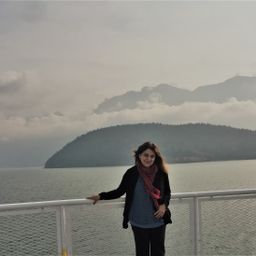
Gada Mahrouse
She/Her
Sessions auxquelles Gada Mahrouse participe
Dimanche 20 Juin, 2021
Touristifying the refugee crisis? Exploring refugee-run tourism enterprisesbyGada MahrouseAs the world faces an ongoing global refugee “crisis,” tourism is growing exponentially. Given the scale of both, questions of mobility justice are of the utmost urgency. Yet, with a few notable exceptions, academic research has yet to examine the ways in which tourists and refugees interact. Informed by Zygmunt Bauman’s (1998) work on the figures of the “tourist and the figure and what ...
Sessions auxquelles Gada Mahrouse assiste
Samedi 19 Juin, 2021
L’accroissement de la fréquentation touristique dans certains lieux devenus des « destinations » a, ces derniers temps, remis à l’avant-plan le vieux paradigme du tourisme destructeur. Ici et là, l’on dénonce non seulement l’invasion des milieux de vie et la transformation des fonctions urbaines en fonction des attentes touristiques, mais aussi la destruction du patrimoine par l’altération de son authenticité. Simplement xénophobe ou carrément positiviste, une telle assertion, fondée sur l...
Dimanche 20 Juin, 2021
Becoming common plantain: metaphor, settler responsibility, and decolonizing tourismby Michela J. Stinson,Bryan S. R. GrimwoodandKellee CatonAs tourism scholars have turned to matters of reflexivity, epistemology, and ethics in research and practice, questions have been raised about how those in positions of privilege ought to situate their knowledge/power and take responsibility for enacting justice. In this presentation, we convey and engage the mer...
Lundi 21 Juin, 2021
The Night Walk: from a dangerous migration to a tourist performance.ByJafet Quintero VenegasandAlvaro LopezThe Night Walk is a recreational activity organized by the Hñahñú community of the town of El Alberto, municipality of Ixmiquilpan, state of Hidalgo, Mexico, and is part of the menu of activities that tourists who visit the area can hire. This is a performance that involves several actors that represent the migratory phenomenon of undocumented Mexicans tryi...
Tourism RESET will be leading a special track: BI-POC issues in tourism, travel, and mobility. Black, Indigenous, and people of color (BI-POC) have endured racial inequalities, segregation and systemic racism for centuries. Globally, travel and tourism has been overpoweringly White-washed, leaving limited room to highlight the experiences and voices of traditionally marginalized groups, the result lending itself ...
Ethical and Equitable Tourism DataBy Evita RobinsonThis keynote covers the intersection of data and tourism. In 2020 NOMADNESS Travel Tribe and Tourism RESET had over 5200 respondents to their survey of BIPOC (Black, Indigenous, People of Color) Travelers. The 89-page qualitative and quantitative report methodology is also a case study on how data is more robust when academia and industry work together. The 26,000+ member NOMADNESS community was the bridge to harnessing t...
Liminal potentialities in the Quartier de Spectacles, Montreal, CanadabyMeghan L. MuldoonandDominic LapointeLiminality, from the Latin limen meaning ‘threshold,’ was first described by van Gennep (1909) to describe those rites of passage present in every society that mark the transition between one state of being or identity to another, emergent state (Thomassen, 2009, 2010). The accustomed order of things becomes suspended, creating a state of chaos an...
Diversifying tourism, hospitality and struggles in the politics of urban tourismbyChristopher WilbertFor some decades now, a well established pattern has been in place whereby tourism growth in medium to large cities was seen as a good, requiring minor adjustments to diversify it spatially. European cities, like London, Cambridge, Barcelona, Bergamo have been seeking to divert some tourism beyond the central cultural, shopping and business districts, into wider areas not ...
Priviledging indigenous voices: A participatory oriented approachbyXiaotao YangandHeather MairIn 2012, Peters andHiggins-Desbiolles, wrote “What is wholly absent [from the tourism literature] …is any recognition of Indigenous peoples as tourists”(p.78).Chambers and Buzinde (2015) acknowledged that “tourism knowledge is still predominantly colonial” (p.1) because Eurocentric epistemologies are still privileged and people from the South continue to be research...
Enacting worldmaking agency: multiple visions of tourism in Lunenburg Nova ScotiabyMyra J. CoulterFollowing the Atlantic fisheries crisis of the 1990s, coastal communities have been undergoing deindustrialization and economic diversification through the development of services-sector activities, including tourism. With a permanent resident population of 2,263, Lunenburg, Nova Scotia has been capitalizing upon UNESCO World Heritage Site status awarded in 1995, thereby transfor...
Mardi 22 Juin, 2021
Liberating Theater in the Realm of TourismbyYaniv BelhassenandCaroline Demeyère In his earliest writings, Augusto Boal (1979) elucidates his theatrical philosophy and the way it is manifested in each one of the techniques associated with what he calls, and has been thereafter known as, “The Theater of the Oppressed.” In his opinion, anybody who is restricted in their ability to act is oppressed and the theater is the means to emancipate them. Boal...
We are living in an era of growing illiberalism and authoritarianism. Tourism scholars must confront this trend and consider what it means for how we understand democracy, justice, and power. Framed by a critical, political economy approach, the presentation situates the illiberal/authoritarian turn within the broader context of a changing neoliberal landscape, which is inspired by, and supportive of, so-called populist (ethno-nationalist) movements, ...